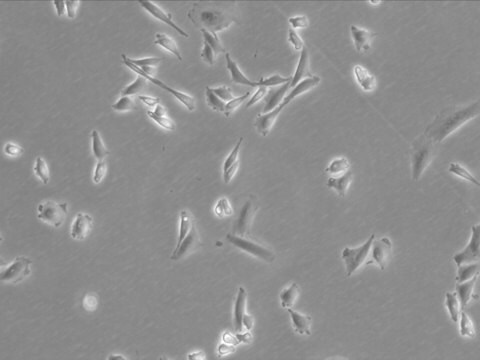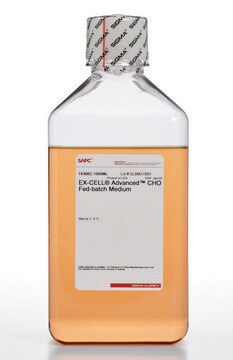CHOK1
CHOZN® CHO K1 Host Cell Line
Suspension-adapted in CD media
Autenticatiper visualizzare i prezzi riservati alla tua organizzazione & contrattuali
About This Item
Codice UNSPSC:
12352200
Prodotti consigliati
Descrizione
CHOK1 cell line derived from ECACC CHO K1
Livello qualitativo
Condizioni di spedizione
dry ice
Temperatura di conservazione
−196°C
Descrizione generale
A subclone of the parental CHO cell line, which was derived from the ovary of an adult Chinese hamster. Cells require proline due to the absence of the gene for proline synthesis, the block in the biosynthetic chain lies in the step converting glutamic acid to glutamine γ serialdehyde. They undergo morphological changes in response to cholera toxin.
CHO-K1 cells derived from ECACC CHO K1 and adapted to suspension and serum-free, chemically defined media. Cells are cGMP banked in chemically defined, animal component-free EX-CELL® CD CHO Fusion medium.
Origine della linea cellulare
Hamster Chinese ovary. The parental CHO-K1 cell line was originated by Puck in 1957.
Stato fisico
CHOZN CHO K1 cells are provided to customers in vials containing 1 mL at 107 cells/mL. Cells are banked in EX-CELL CD Fusion medium containing 4mM L glutamine and 7% DMSO.
Note legali
The CHOZN CHO K1 cell line is sold for research use only. For use of this cell line in a commercial process, a commercial license must be taken.
CHOZN is a registered trademark of Merck KGaA, Darmstadt, Germany
EX-CELL is a registered trademark of Merck KGaA, Darmstadt, Germany
Codice della classe di stoccaggio
10 - Combustible liquids
Classe di pericolosità dell'acqua (WGK)
WGK 3
Punto d’infiammabilità (°F)
Not applicable
Punto d’infiammabilità (°C)
Not applicable
Certificati d'analisi (COA)
Cerca il Certificati d'analisi (COA) digitando il numero di lotto/batch corrispondente. I numeri di lotto o di batch sono stampati sull'etichetta dei prodotti dopo la parola ‘Lotto’ o ‘Batch’.
Possiedi già questo prodotto?
I documenti relativi ai prodotti acquistati recentemente sono disponibili nell’Archivio dei documenti.
T M Trask et al.
The Journal of biological chemistry, 275(32), 24400-24406 (2000-05-29)
Alignment of tropoelastin molecules during the process of elastogenesis is thought to require fibrillin-containing microfibrils. In this study, we have demonstrated that amino-terminal domains of two microfibrillar proteins, fibrillin-1 and fibrillin-2, interact with tropoelastin in solid phase binding assays. The
C Peters et al.
Scientific reports, 6, 31879-31879 (2016-09-02)
Dravet syndrome is the prototype of SCN1A-mutation associated epilepsies. It is characterised by prolonged seizures, typically provoked by fever. We describe the evaluation of an SCN1A mutation in a child with early-onset temperature-sensitive seizures. The patient carries a heterozygous missense
Clara Stead et al.
Journal of biomolecular screening, 21(10), 1042-1053 (2016-07-15)
Glycine receptor 3 (GlyRα3) is a ligand-gated ion channel of the cys-loop family that plays a key role in mediating inhibitory neurotransmission and regulation of pain signaling in the dorsal horn. Potentiation of GlyRα3 function is therefore of interest as
Junji Yamashita et al.
Journal of immunology (Baltimore, Md. : 1950), 191(2), 949-960 (2013-06-19)
Crohn's disease (CD) is a chronic inflammatory disorder of the gastrointestinal tract, where excessive Th1 cell responses are observed. We performed experiments to identify immunologically bioactive proteins in human plasma and found that paraoxonase (PON)-1, which has esterase activity and
Nouran Abualsaud et al.
Frontiers in cell and developmental biology, 8, 627090-627090 (2021-03-09)
Neuropeptide Y (NPY) has been implicated in the regulation of cellular motility under various physiological and pathological conditions, including cancer dissemination. Yet, the exact signaling pathways leading to these effects remain unknown. In a pediatric malignancy, neuroblastoma (NB), high NPY
Il team dei nostri ricercatori vanta grande esperienza in tutte le aree della ricerca quali Life Science, scienza dei materiali, sintesi chimica, cromatografia, discipline analitiche, ecc..
Contatta l'Assistenza Tecnica.



